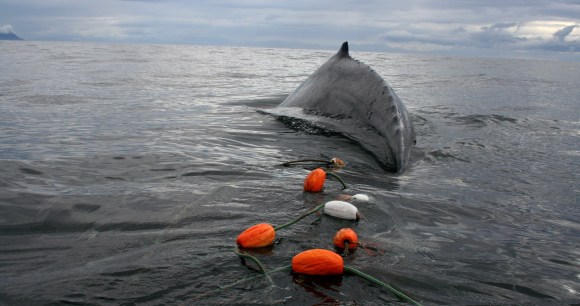
Washington, DC—A report issued today by conservation groups finds that 11 nations have at least some fisheries that fail to meet US standards for preventing whale and dolphin bycatch. Entanglement in fishing gear kills hundreds of thousands of marine mammals around the globe every year.
The Marine Mammal Protection Act (MMPA) requires the US government to ban seafood from nations that fail to meet the same strict standards to prevent marine mammal bycatch that US fishers must meet. But the National Marine Fisheries Service (NMFS) recently delayed any decision on blocking imports from noncompliant nations until 2025.
“We found that some foreign fisheries are doing almost nothing to monitor or prevent marine mammal bycatch, and US officials must follow the law and block certain seafood imports linked to deadly entanglements,” said Dianne DuBois, staff scientist at the Center for Biological Diversity. “US fishers have made big changes to reduce the killing of whales and dolphins. It’s time for other nations to step up. This is a chance for the huge US seafood market to help save marine mammals around the world.”
Today’s report, “Ban Bycatch: The United States Must Ban Seafood Imports from Countries Failing to Protect Marine Mammals,” is jointly produced by the Center for Biological Diversity, NRDC (Natural Resources Defense Council), the Animal Welfare Institute, and the Environmental Investigation Agency. It assessed 11 countries of various income levels and fishing capacities: Canada, Ecuador, Fiji, France, India, Indonesia, Mexico, Norway, South Africa, South Korea, and the United Kingdom. The report found almost all lack sufficient monitoring, bycatch limits or enforcement to meet these standards, and at least some fisheries within these countries should be subject to import bans under the MMPA. It is likely that many additional countries also fail to meet US standards.
“By continuing to allow imports that do not meet US standards, NMFS chooses business as usual over the survival of some of the most amazing species on the planet,” said Zak Smith, a senior attorney and director of global biodiversity conservation at NRDC. “Because NMFS has failed to safeguard ocean biodiversity, future generations may never have the chance to protect invaluable marine life.”
The MMPA has required the US government to ban seafood from nations with excessive bycatch since 1972. But NMFS largely ignored the mandate until 2016, when the agency finally set a deadline of 2021 for nations to meet US standards or face an import ban. That deadline was extended to 2022, then to 2023. On Nov. 17, the agency again extended the deadline through December 2025.
“For decades, US consumers have made it clear that they do not wish to buy seafood caught using methods that result in the suffering and death of marine mammals,” said Kate O’Connell, senior policy consultant for the Animal Welfare Institute’s Marine Life Program. “NMFS’ job is to ensure that all commercial fishing operations exporting seafood to the United States comply with federal standards, and yet the agency keeps breaking its own deadlines.”
Assessments of publicly available data from the 11 countries examined reveal that their export fisheries are unlikely to meet US standards for marine mammal bycatch. Most countries fail to evaluate the status of marine mammals, do not adequately monitor bycatch, lack sufficient bycatch limits, and often fail to enforce existing measures. Several of these nations don’t even know how many marine mammals are in their waters, much less how many die in nets and fishing lines. In others, bycatch is known to threaten imperiled species, such as the nearly extinct vaquita in Mexico and harbor porpoises in Norway, yet these countries have failed to effectively limit the killings.
The United States is the world’s largest importer of seafood, importing between 70% and 85% of seafood consumed within the country. This amounts to more than 6 billion pounds of fish, shellfish and other seafood products worth more than $21 billion annually, accounting for more than 15% of the global value of marine food products in trade.
“Bycatch of dolphins, porpoises, and other marine mammals is unsustainable in many fisheries around the world, it regularly goes undocumented and unmanaged and, as a result, many populations are threatened or endangered,” said Sarah Dolman, senior ocean campaigner for Environmental Investigation Agency UK. “This US law provides a once-in-a- lifetime opportunity to prevent many thousands of these deaths, and we simply can’t afford to wait any longer.”
Marjorie Fishman, Animal Welfare Institute
[email protected], (202) 446-2128
Kate O’Connell, Animal Welfare Institute
[email protected], (860) 990-7858 (en español)
Dianne DuBois, Center for Biological Diversity
[email protected], (413) 530-9257
Kari Birdseye, Natural Resources Defense Council
[email protected], (415) 350-7562
The Animal Welfare Institute (awionline.org) is a nonprofit charitable organization founded in 1951 and dedicated to reducing animal suffering caused by people. AWI engages policymakers, scientists, industry, and the public to achieve better treatment of animals everywhere—in the laboratory, on the farm, in commerce, at home, and in the wild. Follow us on Facebook, X (formerly Twitter), and Instagram for updates and other important animal protection news.
The Center for Biological Diversity is a national, nonprofit conservation organization with more than 1.7 million members and online activists dedicated to the protection of endangered species and wild places.
NRDC (Natural Resources Defense Council) is an international nonprofit environmental organization with more than 3 million members and online activists. Established in 1970, NRDC uses science, policy, law, and people power to confront the climate crisis, protect public health, and safeguard nature. NRDC has offices in New York City, Washington, D.C., Los Angeles, San Francisco, Chicago, Bozeman, MT, Beijing and Delhi (an office of NRDC India Pvt. Ltd). Visit us at www.nrdc.org and follow us on Twitter @NRDC.